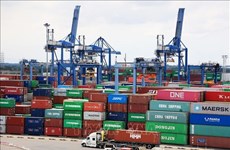Hanoi takes moves against inflation
Hanoi should focus on tightening expenditures, reducing spending
and stabilising the four key areas of commodities, prices, interest
rates and exchange rates in order to join with localities nationwide to
curb inflation, said Permanent Deputy Prime Minister Nguyen Sinh Hung.
Hanoi should focus on tightening expenditures, reducing spending
and stabilising the four key areas of commodities, prices, interest
rates and exchange rates in order to join with localities nationwide to
curb inflation, said Permanent Deputy Prime Minister Nguyen Sinh Hung.
The city should take harmonious measures to curb inflation while managing prices in order to create conditions for investors while also creating more effective production, he said at a meeting held by Hanoi authorities on March 5 to implement the Government Resolution on taking measures to curb inflation, stabilise the macro-economy and ensure social security.
The city needed to take more drastic measures in its monetary policy and credit growth management and control, particularly by paying more attention to exports to reduce the trade gap, Hung said.
It was essential to mobilise involvement of the whole society to curb inflation by creating changes in awareness and daily consumption habits of people in all walks of life, he added.
Success in curbing inflation in Hanoi and other cities will lead to the success of the whole country, he stressed.
Municipal People's Committee Chairman Nguyen The Thao said the city will focus on taking a number of key measures, including seriously implementing tight monetary policy and managing credit growth to keep it under 20 percent in 2011.
Particularly, the city will focus on inspecting gold and foreign currency trading and strictly punishing those involved in speculation and illegal gold and foreign currency trade, he said.
The city will also increase management to prevent budget loss and make the maximum possible cost reductions for organising conferences and meetings, as well as domestic and foreign business trips, Thao said.
Implementation of delayed and ineffective projects with State budget investment will be cancelled or postponed, while investment will be poured into social infrastructure projects, and rural and agriculture projects, Thao said.
Regarding measures to ensure social security, the municipal Department of Labour, Invalids and Social Affairs will actively work with districts in the city to implement the city's job creation programme during the 2011-15 period with a target of generating jobs for 137,000 workers.
Credit priority will be given to poor households and those near the poverty line to help them with production development and labour export, Thao said.
The city will continue to provide an allowance for around 2,000 poor households and people who rendered great services to the country.
Other provinces and cities nationwide are also carrying out the Government's measures on inflation control in an effort to maintain economic stability and ensure social welfare.
Phu Yen province, for example, will review regular State budget expenditures and create measures to save 10 percent of its expenses for the rest of the year.
The province will also monitor credit at banks and credit institutions to keep the growth rate under 20 percent.
Similarly, Quang Tri province will work to cut 10 percent of public expenditures and reduce energy spending.
Other provinces, including Lai Chau, Ha Tinh, Hoa Binh and Ha Nam , have also mapped out measures to control inflation.
The north-central province of Ha Tinh , for example, has asked commercial banks to give priority to capital for the production and trading sectors, and stop lending to non-manufacturing, real estate companies and the stock market.
The province has also ordered agencies to speed up construction on the province's key projects such as Vung Ang 1 Thermal Power Plant and Sai Gon-Ha Tinh Beer brewery.
Lai Chau province targets saving 10 percent of annual State budget spending of more than 26 billion VND (1.3 million USD).
It has called on agencies, organisations and institutions to increase savings in electricity, water, telephone, office supplies and petrol.
Ha Nam province People's Committee plans to review the performance of enterprises in the province to solve any difficulties, and impose strict penalties to those who violate laws and regulations.
The authorities have also ordered the provincial Bank for Social Policy to offer loans to poor households, disadvantaged students and beneficiaries of social welfare, who need capital to start businesses or to study or work abroad./.
The city should take harmonious measures to curb inflation while managing prices in order to create conditions for investors while also creating more effective production, he said at a meeting held by Hanoi authorities on March 5 to implement the Government Resolution on taking measures to curb inflation, stabilise the macro-economy and ensure social security.
The city needed to take more drastic measures in its monetary policy and credit growth management and control, particularly by paying more attention to exports to reduce the trade gap, Hung said.
It was essential to mobilise involvement of the whole society to curb inflation by creating changes in awareness and daily consumption habits of people in all walks of life, he added.
Success in curbing inflation in Hanoi and other cities will lead to the success of the whole country, he stressed.
Municipal People's Committee Chairman Nguyen The Thao said the city will focus on taking a number of key measures, including seriously implementing tight monetary policy and managing credit growth to keep it under 20 percent in 2011.
Particularly, the city will focus on inspecting gold and foreign currency trading and strictly punishing those involved in speculation and illegal gold and foreign currency trade, he said.
The city will also increase management to prevent budget loss and make the maximum possible cost reductions for organising conferences and meetings, as well as domestic and foreign business trips, Thao said.
Implementation of delayed and ineffective projects with State budget investment will be cancelled or postponed, while investment will be poured into social infrastructure projects, and rural and agriculture projects, Thao said.
Regarding measures to ensure social security, the municipal Department of Labour, Invalids and Social Affairs will actively work with districts in the city to implement the city's job creation programme during the 2011-15 period with a target of generating jobs for 137,000 workers.
Credit priority will be given to poor households and those near the poverty line to help them with production development and labour export, Thao said.
The city will continue to provide an allowance for around 2,000 poor households and people who rendered great services to the country.
Other provinces and cities nationwide are also carrying out the Government's measures on inflation control in an effort to maintain economic stability and ensure social welfare.
Phu Yen province, for example, will review regular State budget expenditures and create measures to save 10 percent of its expenses for the rest of the year.
The province will also monitor credit at banks and credit institutions to keep the growth rate under 20 percent.
Similarly, Quang Tri province will work to cut 10 percent of public expenditures and reduce energy spending.
Other provinces, including Lai Chau, Ha Tinh, Hoa Binh and Ha Nam , have also mapped out measures to control inflation.
The north-central province of Ha Tinh , for example, has asked commercial banks to give priority to capital for the production and trading sectors, and stop lending to non-manufacturing, real estate companies and the stock market.
The province has also ordered agencies to speed up construction on the province's key projects such as Vung Ang 1 Thermal Power Plant and Sai Gon-Ha Tinh Beer brewery.
Lai Chau province targets saving 10 percent of annual State budget spending of more than 26 billion VND (1.3 million USD).
It has called on agencies, organisations and institutions to increase savings in electricity, water, telephone, office supplies and petrol.
Ha Nam province People's Committee plans to review the performance of enterprises in the province to solve any difficulties, and impose strict penalties to those who violate laws and regulations.
The authorities have also ordered the provincial Bank for Social Policy to offer loans to poor households, disadvantaged students and beneficiaries of social welfare, who need capital to start businesses or to study or work abroad./.













